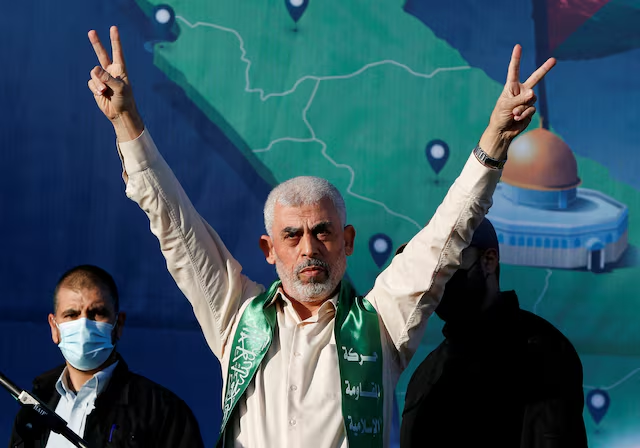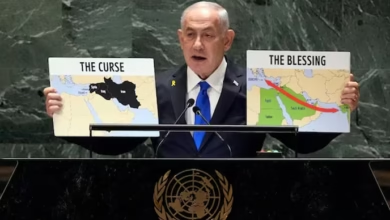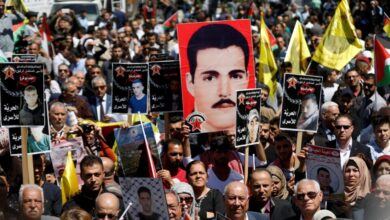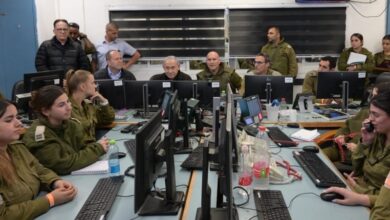Who Was Yahya Sinwar? From Prison to Hamas Power
The story of Yahya Sinwar from prisoner to Hamas leader and symbol of Palestinian resistance

Yahya Ibrahim Sinwar was born in October 1962 in the Khan Younis refugee camp in southern Gaza. His parents were forcibly displaced from their home in the city of Majdal, northeast of the Gaza Strip, by the Israeli army during the 1948 Nakba War; this city is now known as Ashkelon.
Sinwar experienced a challenging childhood under the Israeli occupation’s assaults, sharing a life similar to many Palestinians who continued their education despite the hardships of war.
He attended Khan Younis Secondary School for Boys and later joined the Islamic University of Gaza, where he earned a bachelor’s degree in Arabic studies. As an adult, he married and raised a family, staying determined to achieve the goals of ending the occupation and ensuring the right of return.
Sinwar’s dedication to resisting the occupation eventually placed him at the top of Israel’s assassination list. This article explores the life of the man who has kept Israel on high alert in its efforts to locate and eliminate him.
“Our blood and souls are no more precious than the blood and soul of the youngest martyr who gave his life for this homeland”
Yahya Sinwar
Sinwar‘s Political life
Before Yahya Sinwar’s involvement in Hamas, he had a history of political activism during his university years, joining the Islamic bloc linked to the Muslim Brotherhood.
Through his leadership roles within the bloc, Sinwar gained valuable experience that would later support him in his journey within Hamas. In 1986, Sinwar established the Hamas Security Apparatus under the guidance of Sheikh Ahmed Yassin, known as the Organization for Jihad and Preaching, or “Majd.”
The primary aim of this apparatus was to counteract Israeli collaborators and expose espionage operations targeting Palestinian resistance and society. Sinwar supervised and managed this apparatus for three years, uncovering numerous collaborators coerced by the occupation into providing intelligence.
Following the outbreak of the First Intifada in 1987, the Islamic Resistance Movement (Hamas) officially declared its formation and issued a statement to confront the occupation, with Sinwar quickly assuming a leadership role due to his intelligence and strategic skills.
In 1988, Sinwar was arrested and endured intense torture for six weeks following the discovery of armed cells connected to Majd.
Yahya Sinwar’s Imprisonment and Resistance in Jail
Yahya Sinwar was first arrested in 1982 due to his student activism at the age of 20. During this time, he joined a group of university students on a visit to Palestinian women in Jenin, who were allegedly victims of an Israeli poisoning attempt.
However, this visit turned out to be a trap to detain Sinwar, leading to his administrative detention for six months without trial. The allegations against him were linked to supposed involvement in “Islamic subversive activities.”
Despite no formal charges, Sinwar’s arrests didn’t end there; he was re-arrested in 1988 and sentenced to four life terms.
His activities did‘nt stop during imprisonment; Sinwar continued his leadership by heading Hamas’s Higher Leadership Committee for prisoners. He used his time in prison to acquire various skills, including learning Hebrew to understand the enemy’s strategy and mindset.
Sinwar attempted to escape twice but failed, resulting in extended periods of solitary confinement, deteriorating health, and family visitation restrictions. These challenges only strengthened his resolve and resistance, establishing Sinwar as a formidable figure for the Israeli occupation forces.
After 23 years in prison, Sinwar was released in October 2011 as part of a prisoner exchange deal in return for Israeli soldier Gilad Shalit, becoming one of over a thousand freed prisoners.
Sinwar quickly resumed his activities outside, securing a seat on Hamas’s Political Bureau in 2012. Five years later, in 2017, Sinwar was elected as Hamas’s leader in Gaza, succeeding Ismail Haniyeh. That same year, Hamas underwent a system reform and expressed openness to a two-state solution. Sinwar’s role involved efforts to reconcile relations between the Palestinian Authority, led by Fatah, and Hamas, although without success.

Yahya Sinwar’s Role in the Al-Aqsa Flood Operation
As we know, the world witnessed a major shift in the Palestinian cause with the launch of the Al-Aqsa Flood operation.
Yahya Sinwar quickly became Israel’s top target, as they consider him the mastermind behind the October 7 attack. Eliminating Sinwar has become one of the main strategic goals of the Israeli military operation in Gaza. Sinwar has not appeared publicly during the conflict, facing strict restrictions and being placed on Israel’s list of most dangerous individuals.
After Ismail Haniyeh’s assassination on July 31 in Tehran, Hamas unanimously chose Sinwar as the head of its political bureau.
Writings of Yahya Sinwar
- Thorns of Carnation: is a novel published in 2004 that tells the story of the Palestinian struggle from 1967 to the Al-Aqsa Intifada. The novel highlights the challenges and conflicts faced by Palestinians during this period while providing glimpses into their daily lives and hopes for freedom and independence. Through its diverse characters, the novel reflects the human dimensions of the struggle, making it one of the significant works of contemporary Palestinian literature
- Al-Majd: was published in 2010 and documents the operations of the Israeli Shin Bet (Shabak) in gathering intelligence, planting, and recruiting agents. It details the brutal physical and psychological methods used in interrogations, as well as the evolution of investigative theories and techniques, the complexities that have arisen, and their limitations.
- Hamas: Trial and Error : explores the experience and evolution of the Hamas movement over time. The book examines the challenges faced by the movement, the strategies it has adopted, and the mistakes made throughout its journey, providing a comprehensive insight into how Hamas has been shaped as a political and resistance force in the Palestinian arena.
The Final Scene: The Martyrdom of Sinwar
On Thursday, October 17, 2024, the Israeli army issued a statement regarding a clash in Gaza, and Israeli Army Radio published photos and reports claiming that Yahya Sinwar was eliminated in the clash. Following DNA testing, Israeli media sources quoted the army as saying, “The operation targeting Sinwar in Rafah was unplanned; it happened by chance and resulted in Sinwar’s elimination.”
On Friday, October 18, Hamas announced the martyrdom of its leader, Yahya Sinwar, and mourned his loss, stating that “Sinwar fell advancing, not retreating, engaging at the forefront of the ranks and moving between combat positions.” In his final scene, Sinwar stood as a fighter to the last moment, resisting the Israeli enemy with determination to raise the flag of victory.





